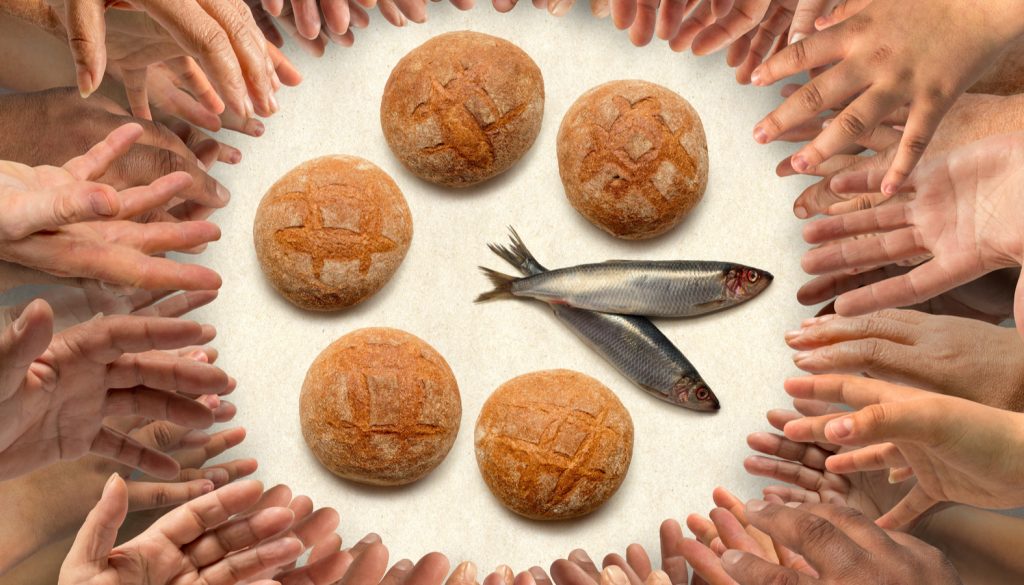One of our Gospel readings during Advent was Matthew’s account of the miracle of the loaves and fishes. Christ went up on the mountain, near the Sea of Galilee. He sat down. “Great crowds” came to him: the lame, the blind, the deformed, the mute. “They placed them at his feet and he cured them.”
You can picture the stage set: Christ, the Messiah, seated on top of the mountain, the crowds so far below they are literally at his feet. They have to crane their necks to see his face.
This would be the place where an earthly king would whip out his scepter, call for his crown, and start issuing orders to his minions. But Christ is completely different than an earthly king.
Far from using his office to summon more power to himself, he lets his power go out to those who need healing, which is another way of saying those who need love. They’re thronging his place on the mountain, jostling, elbowing, handing forward the sickest one by one to the front. We can picture him bending down, cocking his head to hear, reaching out to tenderly touch heads, faces, hands.
“Jesus did not deem equality with God something to be grasped out. Rather, he emptied himself, taking the form of a slave” (Philippians 2:6–7). He emptied himself and in the emptying, cured droves, swarms, hordes of the desperate: the lame walked, the deaf heard, the blind saw. And they gave glory to Israel.
But that’s not enough. After three days — imagine how exhausted Christ must have been after three solid days of self-emptying — his heart is moved with pity. They’re hungry, he realizes; they might collapse on the way home.
I wonder if the reason the thought occurred to him was that he was hungry himself. When had he had time to eat? Plus, if he and the 12 disciples were down to seven loaves of bread and a few fish for the journey home, their own larder wasn’t exactly overflowing, either.
The disciples react exactly as most of us would: “Is it not enough we’ve been opening our veins for these people for three days? We’re hungry, too! They can walk and hear and see now: tell them to buy their own darn bread!”
But nowhere in the Bible is it said, “God helps those who help themselves.” God the Father helps those who can’t help themselves. So Christ orders the disciples to bring their own relatively meager provisions, gives thanks, breaks the bread and — the multitude is fed.
We’re called to do the same. Raïssa Maritain, poet, contemplative, and wife of Catholic philosopher Jacques Maritain, observed: “I have the feeling that what is asked of us is to live in the whirlwind, without keeping back any of our substance, without keeping back anything for ourselves, neither rest nor friendships nor health nor leisure — to pray incessantly … in fact to let ourselves pitch and toss in the waves of the divine will till the day when it will say: ‘That’s enough.’ ”
Last week, just for the heck of it, I opened a Word doc, entitled it “Circle People,” and started randomly typing the many, many names that came to mind. People who over the years since I began writing have shared their stories, conflicts, troubles, and joys, asked me for prayers, offered their own, invited me to wrestle with an issue of the day — people who have thanked, encouraged, supported, challenged, and corrected me.
Some are priests; some would not step foot in a church of any kind if you paid them. Some, I’d wager, voted one way in November; some voted another. Some have welcomed me to their parishes to speak. Some have asked me to help them to discern a vocation or a decision.
I realized that while I’d been going about what I think of as my “real work,” this incredible network of connections, generated by a kind of holy energy, had formed itself. I started wondering if perhaps this kind of small circle, available to all of us, requiring no special training, charism, gift, and thus utterly within our reach, is one way that we can evangelize.
If only we’re willing to stretch a little, risk a little, leave our comfort zones, I started thinking! Why, we could spread the Gospels, by which I simply mean love, to the ends of the earth!
The miracle of the loaves and fishes is so dramatic, remarkable, and unexpected that we tend to skip over the coda. When I went back to the parable, what jumped out at me was: “They all ate and were satisfied. They picked up the fragments left over — seven baskets full.”
We’re called to give from our substance. But in the abundance of God, there is always something in it for us.
That’s when I realized that I haven’t been feeding the Circle People. In my profound hunger and need — they’ve been feeding me.

